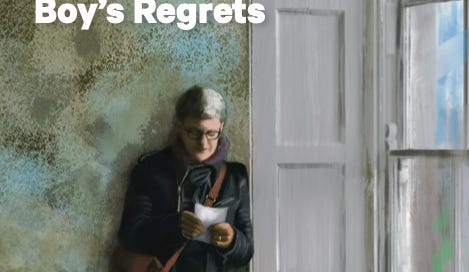Samovar Books, Avonbeg, Newtownpark Avenue, Blackrock, Co. Dublin
Published September 2022. Copyright © Louis Hemmings 2022
All rights reserved. No part of this publication may be reproduced, stored in a retrieval system, or transmitted in any form or by any means, electronic, photocopying, recording or otherwise, without the prior permission of the publisher. The right of Louis Hemmings to be identified as the author of this work has been asserted by him.
All characters and events in this publication, other than those clearly in the public domain, are fictitious and any resemblance to real persons, living or dead, is purely coincidental.
Louis Hemmings links: https://linktr.ee/louishemmings
Cover artwork: Neringa Normantaite
https://www.instagram.com/nn_design_and_illustration/
” Any story in a restricted setting - especially when everybody sleeps on site - (like boarding school) has the opportunity for enhanced drama and tension… from midnight feasts to… smuggling, to bullying, all these make for great drama.”
- Anna Smith, film critic & broadcaster.
“… Loneliness is not a disease from which one can be cured… rather, it is an inescapable fact of human existence… When the dialogue ends, he has experienced himself in the new dimensions, evoked by the other person, and he has learned of the personal world of another. He is enlarged and changed.”
- Sidney M. Jourard ‘The Psychotherapist as Psychedelic Man.’
Photographs are relics of the past, traces of what has happened. If the living take that past upon themselves, if the past becomes an integral part of the process of people making their own history, then all photos would reacquire a living context, they would continue to exist in time, instead of being arrested moments. -
- John Berger ‘About Looking.’
Previously…
Ben, a retired used bookseller and poet, inherits a large sum of money and a big house in the country. His new-found wealth offer much free time, he decides to enrol on a creative writing diploma course.
During his studies, Ben discovers he can write credible fiction. In class Alma, a female college graduate and memoir author, becomes his nurturing ally, collaboratively editing his poetry. She encourages Ben to enter a literary competition, which he does and subsequently wins.
____________________________________________________________________________
Ben didn’t tell anyone other than Alma, his favourite classmate, and Martha, his wife, that he had entered the poetry competition. When his winning poem, The Clandestine Cilliní, got published in Poetry Ireland, the editor described Ben’s writing style thus: “Bodkin may well become an important poet with a biblical perspective. Or, just as likely, he could become a fundamentalist, manic ranter…”
That slapstick commendation made Ben smile. Alma asked Ben if he was going to tell the class about his literary breakthrough. He felt embarrassed to mention it, but she felt proud of his accomplishments. On the first evening after term break, Alma seized the opportunity. Her belief in him was a healing balm.
“I want to announce that Ben won a major literary prize over the Christmas holidays,” she said, smiling at Ben, who sat beside her.
The class buzzed with excitement at one of their number achieving such success. This celebratory tide lifted all their boats with literary possibilities. Even the once-skeptical teacher chimed in.
“Well done, Ben. Please read your poem for us.”
Ben read it with confidence, as he did on the theatre stage.
Blank baby stare from abstract, lifeless eyes,
maternal uterus empty, groaned last goodbyes;
creation heaves, the heavenly Father cries.
Stillborn baby stiff, gently laid to rest,
hammered coffin nails, faith put to test,
milk-dampens the maternal full-sailed vest.
When Ben finished reading, the class clapped. Their validation was an affirmation for him.
The following week, the teacher gave the college porter a copy of Ben’s competition winning poem. She asked for it to be tacked onto the notice-board in the common room. It was photocopied on bright yellow paper that made it stand out among the many other notices. Ben wondered who might read it and what responses from other class students might occur?
Being a peer among younger, brighter students, studying in such a dynamic academic environment, invigorated Ben’s imagination. For much of his life, he harboured literary doubts due to lack of self-esteem. His overactive alter ego was a harsh critic.
‘Who am I? Just an autodidact with a penchant for poetry? Can I bring something unique to the Irish literary scene? I could never manage writing a novel. I wouldn’t have the patience or stamina for such a project. However, a novella might be manageable.
Drifting into sleep one night, Ben came up with an unusual title for his novella. He would call it ‘What a Difference a Day Makes’. Soon, he came up with a series of autobiographical and imagined events to create the plot line. It would feature a middle-aged bookseller who inherits money, then retires early and enters college. The hero would exult in the interactions with younger students, revel in the academic atmosphere, then enter and win a national poetry competition.
That storyline intrigued his classmates, and their subsequent positive responses propelled him onwards. Ben couldn’t stop thinking, planning and plotting, writing day and night. He became a monomaniac in his approach. It thrilled him to discover late in his literary life that he could write credible fiction.
His prodigious productivity caught classmates off guard. Most of them struggled with perfectionist aspirations, paralysing their output. Ben just raced on with carefree abandon. He was making up for decades of lost time and the missed college dynamic.




